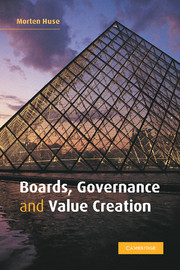Book contents
- Frontmatter
- Contents
- List of tables
- Preface
- 1 Investigating boards of directors
- 2 Internal and external actors
- 3 Board task expectations and theories
- 4 The board members
- 5 Contexts and resources
- 6 Interactions: trust, power and strategising
- 7 Structures and leadership
- 8 The decision-making culture
- 9 Actual task performance
- 10 The value-creating board
- 11 The human side of corporate governance
- Notes
- References
- Index
- Frontmatter
- Contents
- List of tables
- Preface
- 1 Investigating boards of directors
- 2 Internal and external actors
- 3 Board task expectations and theories
- 4 The board members
- 5 Contexts and resources
- 6 Interactions: trust, power and strategising
- 7 Structures and leadership
- 8 The decision-making culture
- 9 Actual task performance
- 10 The value-creating board
- 11 The human side of corporate governance
- Notes
- References
- Index
Summary
‘Only an odd number of people can lead a corporation, and three are too many.’ This chapter looks at the board members both from the demand side and the supply side. The main concepts are the characteristics, competence, compensation and composition of the board and its members.
As has been said before, this book is about the human side of corporate governance. The board members are, necessarily, core players in this respect, but much of the ongoing debate and research hardly even seems to acknowledge that boards have a human side. In this chapter I present the attributes of boards and their members, focusing in particular on three: characteristics, motivation and composition. I also present the selection process for board members.
Board members can be explored and understood both from a demand and a supply perspective. A demand perspective means that there are firms that have a need for board members. The supply perspective means that there are individuals who are available to act as board members. In this chapter I first present the market place for board members. How are board members recruited? Then I present the board members from supply and demand perspectives.
There are four board member features that have dominated not just research but also the public debate. These features have been called ‘the usual suspects’, and are the number of board members, the insider/outsider ratio, CEO duality and shareholding by the board members. In this chapter I make a more in-depth study of board member characteristics and compensation and board composition.
Information
- Type
- Chapter
- Information
- Boards, Governance and Value CreationThe Human Side of Corporate Governance, pp. 69 - 96Publisher: Cambridge University PressPrint publication year: 2007
